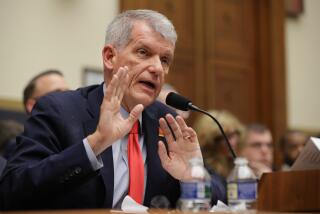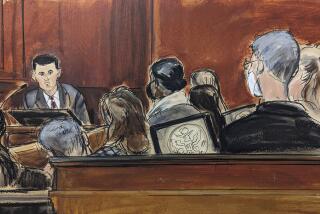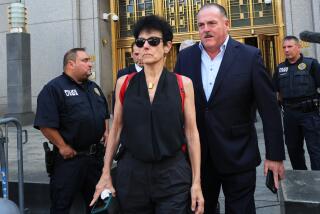Panel grills CEO of Lehman
WASHINGTON — Just days before Lehman Bros. Holding Inc. filed for bankruptcy protection last month, the company sought $23.2 million in “special payments” for three outgoing executives, according to internal documents released by a congressional committee Monday.
The revelation sparked sharp criticism from Rep. Henry Waxman (D-Beverly Hills), chairman of the House Oversight and Government Reform Committee, who has summoned Lehman Chief Executive Richard Fuld to Capitol Hill for the first of at least five hearings on the circumstances that led to the government’s $700-billion Wall Street bailout.
Waxman noted that even as Fuld was trying to persuade Treasury Secretary Henry M. Paulson to help rescue the 158-old-year investment bank, “Lehman continued to squander millions on executive compensation.”
With the vote-counting over and the bailout bill signed into law, Congress is turning its attention to finger-pointing.
Democrats say the rich paydays on Wall Street, combined with lax regulatory oversight by the Bush administration, helped create the environment that led to the mortgage meltdown and the current financial crisis.
Republicans, meanwhile, say Democrats are ignoring their own actions in shielding government-sponsored mortgage lenders Fannie Mae and Freddie Mac from reform attempts.
At Monday’s hearing, Fuld was put on the defensive for millions of dollars he and other executives made as Lehman’s troubles mounted.
Although taking “full responsibility” for the actions that led to the nation’s largest bankruptcy ever, Fuld said the company was overwhelmed by a “financial tsunami” caused by a series of “destabilizing factors,” including lack of investor confidence, “short selling” of financial stocks, credit downgrades and rumors.
“None of us ever gets the opportunity to turn back the clock,” Fuld said. “But with the benefit of hindsight, would I have done things differently? Yes, I would have.”
But the explanation wasn’t good enough for Waxman, who slammed Fuld for earning $484 million in salary, bonuses and stock sales since 2000.
“Your company is now bankrupt, our economy is now in a state of crisis, but you get to keep $480 million,” Waxman said, displaying yearly compensation figures on large TV screens in the hearing room. “I have a very basic question for you. Is this fair?”
Fuld said that the figures weren’t accurate and that he probably received “a little bit less than $250 million -- still a large number, though.”
Waxman then ticked off some of Fuld’s other personal assets -- a $14-million oceanfront home in Florida, a vacation home in Sun Valley, Idaho, and an art collection “filled with million-dollar paintings.”
“It seems that the system worked for you, but it didn’t seem to work for the rest of the country and the taxpayers who now have to pay up to $700 billion to bail out our economy,” Waxman said. “We can’t continue to have a system where Wall Street executives privatize all the gains and then socialize all the losses.”
Waxman released 24 pages of internal company e-mails and other documents that he said undermined Fuld’s “contention that Lehman was overwhelmed by forces outside its control.”
Fuld said he had more of a stake than anybody in the company’s future, noting that he never sold the vast majority of his Lehman stock and still owned 10 million shares when the company filed for bankruptcy.
“I firmly believed we were going to turn back to profitability,” he said.
--
More to Read
Inside the business of entertainment
The Wide Shot brings you news, analysis and insights on everything from streaming wars to production — and what it all means for the future.
You may occasionally receive promotional content from the Los Angeles Times.











